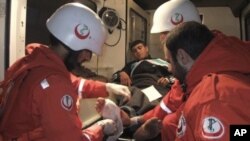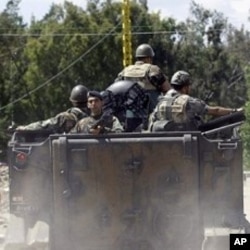Syrian government militia forces continued their siege of the town of Talkalakh on the Lebanese border for a second day Sunday, firing tank shells and rocket-propelled grenades into the besieged city. Hundreds of residents of the town fled into Lebanon Saturday and a number of casualties were reported.
Shelling in Syria
On the Lebanese border with Syria, gunfire and shelling could be heard inside Syrian territory, as witnesses described a second straight day of a government crackdown on the town of Talkalakh.
One man told al-Arabiya TV that bullets were “pouring down on the city like rain,” and that government snipers had blown out water tanks to make residents suffer.
The Syrian government says it is "trying to restore order" after alleged "Islamic fundamentalists" and "terrorists" attempted to set up an Islamic emirate in Talkalakh. Syrian opposition sources said at least three people were killed in Talkalakh and one dead and one wounded soldier were taken to Lebanon.
Palestinian protests
Syrian government TV, meanwhile, broadcast live video of pro-Palestinian protesters gathering along Israel's borders with the Golan Heights and Lebanon Sunday, and announced that the Syrian Foreign Ministry was “condemning” Israel for what it called its “criminal behavior” for firing on protesters.
President Bashar al Assad’s cousin Rami Makhlouf warned Israel in a New York Times interview several days ago that it would have “no security” along the Golan Heights, so long as Syria was not secure. Both the EU and the US recently slapped sanctions on Makhlouf and 12 other prominent Syrians for the bitter crackdown on a number of Syrian towns and cities.
Scores of protesters waving candles and chanting slogans against the government marched in the streets of the Syrian town of Telbissa overnight, according to a video on Facebook. It was not possible to confirm the event, since foreign correspondents are not being allowed into Syria.
Tunisia
Meanwhile, Tunisia’s official news agency reports that the Tunisian army pushed back 200 Libyan soldiers that had crossed the border in the region of Tetouan in southern Tunisia. The agency claimed the Libyans were hoping to retake a border crossing farther north that was recently seized by Libyan rebels.
In the rebel-held western Libyan port city of Misrata, witnesses claim that fighting with loyalists of Moammar Gadhafi has ended and that the rebels now control all of the city. Close to 1,000 people reportedly died during several months of a bitter and brutal siege of the city by Gadhafi forces.
In Britain, armed forces head General David Richards told the Sunday Telegraph newspaper that NATO should increase the scope of its bombing raids inside Libya to end Colonel Gadhafi’s attacks on the opposition. He added that “more intense military action was needed” to prevent the nearly three-month old conflict from ending in a stalemate.
Yemen
In Yemen, hundreds of women protesters demonstrated on the island of Socotra, demanding that President Ali Abdallah Saleh resign. The women also vowed to take their protest to the presidential palace. Several students were also wounded in a protest in Mansoura, near the southern port city of Aden.
The head of the Gulf Cooperation Council, Abdullatif Zayani, met with President Ali Abdallah Saleh in the capital Sanaa Sunday, in a bid to jumpstart a GCC plan to resolve the current crisis. President Saleh initially said that he had accepted the plan, which calls for him to step down, before changing his mind.





